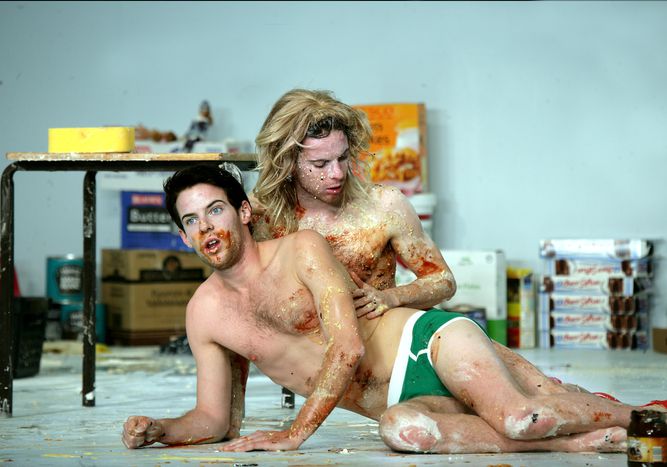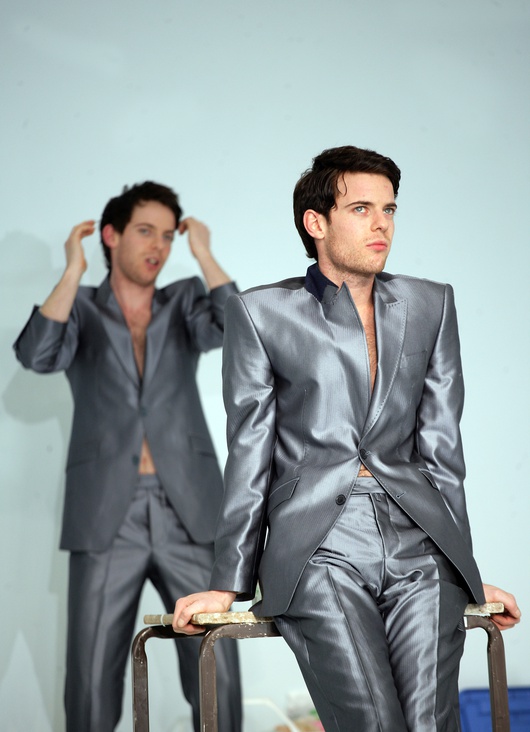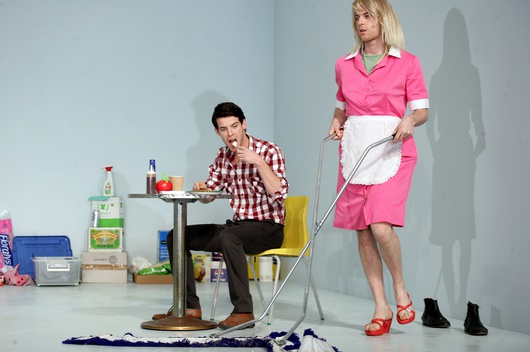
London and Berlin reviews of Mark Ravenhill's 'Over There' play
Published on
Mark Ravenhill’s unconventional play about identical twins who are reunited after growing up in east and west Germany travelled from London to Berlin this spring. Our London reviewer calls it a timely commentary on the EU’s current political troubles. Our Berlin reviewer wonders if the British director reproaches the Germans with the repression of history.
Cross-reviews from the Royal Court and Schaubühne theatres
'Over There' in Berlin: A wall made out of supermarket boxes
''Digging deep and getting dirty' is the name of the international authors' festival about identity and history featuring theatre professionals from different countries. Over There is the British contribution from playwright Mark Ravenhill, who has been a well-known name in the German theatre landscape since the Thomas Ostermeier production of Shopping and Fucking (1998) at the very latest. To be upfront about it: Over There does not dig particularly deep but it definitely gets dirty.
Identical twins Franz and Karl are separated when they are still toddlers. Growing up in different systems, they hold different ideologies and each is convinced that he is in possession of the single truth. Over There is a play about two brothers. It's a drama about relationships which tells of the collision between two different characters and the consequent takeover of the one by the other, in an entertaining, humorous way and in colourful scenes. 'I want us to be one, I want you to be inside me,' Franz says shortly before killing his mirror image who is lying on the floor. The west eats up the east and nothing visible remains of it.
 Mark Ravenhill makes use of all elements of 'In yer face' theatre in order to fascinate the audience: there is simultaneous masterbation, a lot of 'language' is used and – obviously – nudity cannot be left out in any case. The son is portrayed using a washing up sponge, the ashes of the father is a packet of flour from the British supermarket Tesco and the wall is formed from supermarket boxes.
Mark Ravenhill makes use of all elements of 'In yer face' theatre in order to fascinate the audience: there is simultaneous masterbation, a lot of 'language' is used and – obviously – nudity cannot be left out in any case. The son is portrayed using a washing up sponge, the ashes of the father is a packet of flour from the British supermarket Tesco and the wall is formed from supermarket boxes.
The drama about a Germany divided in two, the fall of the wall and the subsequent reunification are above all one thing: a cute backdrop. The portrayal of east and west is stiff and hackneyed. On the one side is Karl, the eternal, anti-progressive socialist who would rather sit by a camp fire than watch pornos; then Franz, the nasty manager-type who talks in empty clichés and always has somewhat too much gel in his hair.
The portrayal of east and west is stiff and hackneyed
Over There does not offer a play about reunification on the twentieth anniversary of the fall of the wall. This is also made clear by the audience's reaction: a lot of applause for the two actors Luke and Harry Treadaway who enhance the play immensely with their perfect, pointed performances. In a subsequent audience questionaire an interesting discrepancy is revealed: 'totally funny' is the main response on the side of the English speaking public while a 'well' or 'too overloaded and lacking in content' dominates on the side of the Germans.
People leaving the theatre stand in the middle of the golden west. Right on the Kurfürstendamm, the avenue of west Berlin, with the KaDeWe as an emblem of all (superfluous) consumption. You actually find yourself though at the backend of the boulevards and here it becomes clear with the bowling alleys, internet cafes, curry houses and junk shops: not all that glistens has been gold for a long time. The wall in our heads – is it still there? This does not become clear in Over There. At the end Franz finds himself in a diner in California and declares, only appalled to a certain extent, that everything German must yield to what is American. Is Mark Ravenhill reproaching the Germans with the repression of history here? Maybe. But maybe not. Perhaps he just wanted to leave the ending open. 'I'll hold you until you fall asleep,' says the crude waitress to him at to end and Franz, tired from the fight, takes himself to her arms. A confidence which he could never quite grant Karl; and this is the tragedy, which really comes across as a tragicomedy, ultimately drifting off into the inevitable reality of superficiality.'
Sandra Wickert, Berlin, translated from German to English by Annie Rutherford
'Over There' in London: timely commentary on EU’s current political troubles
'The stage is boxy and bright. Its geometric neatness contrasts with the Royal Court Theatre’s dusky quaintness in a startling, almost unnerving fashion. The play begins abruptly, with a set of fraternal twins marching briskly down the aisles and on to the stage; one is cross dressed as a buxom American waitress who promptly sets about seducing the other.
 When Mark Ravenhill declared his play Over There to be 'slightly weird', he wasn’t exaggerating.
When Mark Ravenhill declared his play Over There to be 'slightly weird', he wasn’t exaggerating.
The work is an ambitious one. It seeks to unpack the fissures between east and west Germany by staging the re-unification of a pair of twins who have been raised on either side of the Berlin wall. The idea and execution are certainly novel. But after the play’s initial shock value dims, the audience is left in a bit of a lull: the symbols and motifs deployed are obvious, the ideological conflict between the twins predictable.
But slowly, imperceptibly, the psychological and emotional dimensions of the brother’s relationship engulf the audience. For a play that is brash and flashy in many regards, its beauty lies in the subtle way that it builds emotion and tension. Through the twins, Ravenhill masterfully traces the virulent euphoria of the fall of the Berlin wall, the initial fascination with the ‘other’ who is at once deeply familiar and entirely alien, and the gradual souring of a relationship that becomes fraught with jealousy and resentment. Karl, the east German twin, becomes overwhelmed with disorientation as his old life is gobbled up by west Germany’s expansion. His desperate defiance is achingly heartfelt; Franz’s attempts to save him are well-intentioned but tinged with paternalism and arrogance. Franz cannot understand Karl’s 'childish' refusal to reject his east German identity wholesale. But paradoxically, Franz finds himself incapable of sharing his world with his brother. 'I don’t want two of us,' he panics. 'I want just me. You have to go.'
The social experiment played out on Ravenhill’s stage doesn’t just mirror the dislocation brought about by German re-unification. It also raises questions about the European Union’s expansion as a whole. Can different pasts, histories, and identities ever be truly reconciled? Or are there unavoidable political and cultural faultlines that threaten the EU’s ambitious quest for supra-nationalism? These issues are particularly relevant in times of crisis. Take the recent EU summit, which raised the specter of a new 'iron curtain' being drawn to protect the interests of western nations’ faltering economies. As central and eastern European states struggle to ward off total economic meltdown, German chancellor Angela Merkel categorically snubbed Hungary’s plea for an eastern-centric bail out plan. In such an environment, past resentments and divisions are dredged up. And as Ravenhill’s play demonstrates, they can be emotionally explosive.
What Franz and Karl’s relationship most powerfully demonstrates is the extent to which integration and expansion in Europe require profound psychological transformation – on both sides of the east-west divide. Like Franz, western Europe is often deeply reticent to share its wealth and privilege. This phenomenon could be put down to a kind of crude power politics, but perhaps this account is not sufficiently complex.
The west’s accomplishments have long fed a myth of superiority, and a belief that its own civilization is a model for the rest of the world. But as cultural, social, political and economic boundaries begin to blur in the European Union, the west is faced with the uncomfortable prospect of abandoning its old claim to uniqueness. Moreover, in the wake of the financial crisis, it has come face to face with its own painful inadequacies. All of this amounts to the kind if identity crisis faced by Franz as he struggles to both share his lifestyle and retain his individuality.
Over the past few years, the EU leadership has deliberated long and hard to determine when and what parts of the east will be ready to join the west. But rare is it for the west critically reflect upon its own preparedness for integration. What are the implications of this reality for the future of the EU? In Over There, the ideological and psychological differences between Franz and Karl, east and west, are insurmountable. But perhaps the play should be read less as a prediction of political troubles to come and more as a cautionary tale. Perhaps what east and west need is a healthy dose of realism about the differences that exist between them and a readiness to engage in a mutual process of transformation. Until that time, substantive European integration will be neither here nor there.



